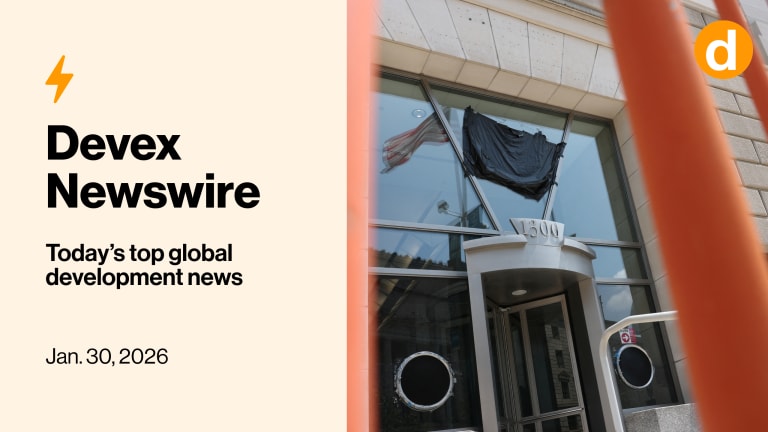
LONDON — The U.K. government withheld information on development program cuts from NGOs and contractors despite promises to work “openly and pragmatically” with suppliers during the pandemic, according to the public aid watchdog.
Delays in deciding which development programs should be protected also “made the required cuts deeper and more abrupt,” according to research by the Independent Commission for Aid Impact, a public body tasked with scrutinizing development policy.
The findings have triggered fears in the development sector about how transparent the government will be as it proceeds with the next round of aid cuts.
Keep up with the latest developments in UK aid
Follow the latest news on the future of the International Development Committee, cuts to the UK aid budget, the upcoming Integrated Review and more with Devex's tracker.
The U.K.’s official development assistance budget was first reduced by £2.9 billion ($3.7 billion) in July, as the government sought to limit aid spending amid the economic fallout of the pandemic.
ICAI — itself currently undergoing a government review — investigated the process used by Department for International Development officials to manage the budget reductions, which took place “late in the year” for such large cuts and “required DFID programme managers to work intensively with suppliers,” according to the report.
The report contains the first publicly-available information about how programming was affected by the cuts. The majority of the cuts — 89% — were achieved by delaying payments to multilateral organizations and CDC Group, the U.K. development finance institution. ICAI warned this approach “may have longer-term implications, including potentially a reduced budget for other activities in 2021.” Just 11% of the cuts fell on bilateral programs.
Details of how the government decided to make its reductions — the result of two prioritization exercises — has not been made public, ICAI noted. But the commission did report that the second process was “drawn up by ministers” and was “not a consultative exercise.”
The report said the “highest priority” was given to COVID-19 programs, and then to government manifesto commitments such as education, ending preventable deaths, climate, economic development, human rights, and security.
DFID “recognised from the outset that the prioritisation process would have a major impact on suppliers,” particularly creating financial difficulties, ICAI noted. At the time, Devex reported on confusion as DFID partners were asked to identify cuts to programs, even as publicly the department insisted no decisions had been made.
The government’s lack of transparency and communication around the prioritization process caused frustration and uncertainty for its partners, according to the report.
“During the period from late May to August, government officials were instructed not to provide any information to suppliers, either about the prioritisation process or the implications for individual programmes,” the report said. ICAI pointed out this was in spite of the government’s own instruction that government departments should work “in partnership with their suppliers, openly and pragmatically.”
It noted the prioritization process was “not a matter of public record until the chair of the International Development Committee, Sarah Champion MP, wrote to the DFID secretary of state on 5 June” asking for details. She later described the process as a “stealth review.”
“This lengthy period without communication was frustrating and caused uncertainty,” according to ICAI. “We heard of cases where officials knew that particular programmes were unlikely to continue, but could not respond to requests for information until the entire package of cuts had been approved.”
It added: “The delay in reaching final decisions made them harder to implement, and made the required cuts deeper and more abrupt.”
Last month, the government announced new cuts to next year’s aid budget, reducing spending from 0.7% of gross national income to 0.5%. There are fears the cuts will be similarly poorly handled.
"It is great to finally be given some data on the cuts and to have it made clear what we had to somewhat guess at [at the time] — which is that the officials were instructed not to share information and that the decisions were being taken at a higher level by ministers,” said Tim Boyes-Watson, global director of Insights and Influence at Humentum, a group working to support development organizations.
“But, along with rescheduling multilateral spending which pushes the problem into 2021, this does not bode well for how the decisions on new [cuts] will be made or where they are likely to fall."
A Foreign, Commonwealth & Development Office spokesperson said: “We welcome ICAI’s recognition that from the outset of the pandemic our decisions on UK aid were carefully considered and quickly carried out so suppliers could continue to deliver essential programmes.
“The UK responded as flexibly as possible to address the impact of the pandemic on the economy, and the resulting fall in the aid budget. We prioritised protecting the most vulnerable and informed our supply partners swiftly once we had made funding decisions.”








